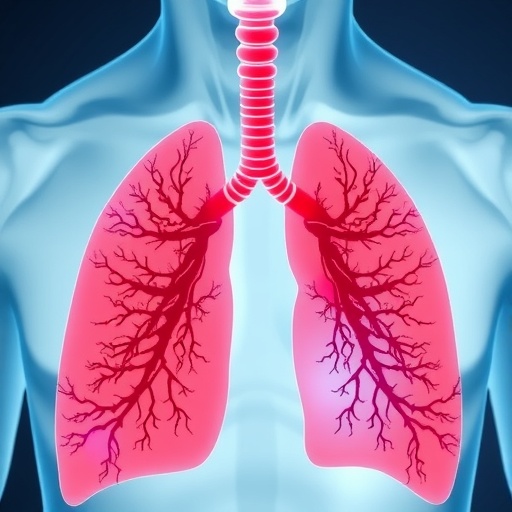In a groundbreaking new study published in Nature Communications, researchers have unveiled compelling links between chronic inflammatory diseases and the heightened risk of lung cancer in individuals who have never smoked. This pivotal investigation counters the long-standing assumption that smoking is the predominant driver of lung malignancies and shines a much-needed spotlight on alternative pathological pathways that may drive oncogenesis in the pulmonary system.
Traditionally, smoking has been lionized as the chief culprit behind lung cancer, accounting for an overwhelming majority of cases worldwide. However, as public health efforts have successfully curtailed smoking rates and as lung cancer diagnosis in never-smokers continues to rise, scientists have increasingly turned their attention to environmental, genetic, and biological factors that may provoke carcinogenesis in this population. The current study meticulously examines inflammatory pathologies—conditions marked by persistent immune system activation—and their potential to foster neoplastic transformation in lung tissues.
The research team employed a large-scale, population-based cohort design, analyzing medical records and biobank samples from thousands of never-smoking patients diagnosed with various inflammatory diseases. These conditions ranged from autoimmune disorders such as rheumatoid arthritis and systemic lupus erythematosus to chronic inflammatory bowel diseases and persistent infections marked by sustained immune dysregulation. The investigators carefully controlled for confounding variables including age, sex, environmental exposures, and family history of cancer.
Mechanistically, chronic inflammation is recognized as a double-edged sword, serving both protective and pathological roles within the human body. While inflammatory responses are essential for combating infections and initiating tissue repair, the prolonged activation of immune cells and the sustained release of pro-inflammatory cytokines can induce DNA damage, promote aberrant cellular proliferation, and facilitate the evasion of normal growth controls—hallmarks of cancer development. The investigators sought to elucidate whether these molecular underpinnings are similarly implicated in lung oncogenesis among never-smokers afflicted with inflammatory disease.
By integrating epidemiological data with molecular assays, the researchers identified a robust association between certain inflammatory conditions and an increased incidence of lung cancer. Notably, individuals with longstanding autoimmune diseases demonstrated a statistically significant elevation in lung cancer risk compared to matched controls without inflammatory conditions. This risk appeared independent of other common factors, firmly placing chronic inflammation as a potential driver of carcinogenesis.
Advanced genomic analyses of lung tissue samples from affected individuals revealed that inflammatory microenvironments fostered genetic alterations commonly observed in lung cancer, including mutations in the TP53 tumor suppressor gene and activation of oncogenic pathways such as the MAPK/ERK cascade. Furthermore, transcriptomic profiling indicated elevated expression of inflammatory mediators like interleukin-6 (IL-6) and tumor necrosis factor-alpha (TNF-α), substantiating the link between inflammatory signaling and malignant transformation.
The study also delved into the role of the lung microenvironment in tumor promotion. Chronic inflammation was shown to induce remodeling of extracellular matrix components and suppression of immune surveillance mechanisms, creating a pro-tumorigenic niche that facilitates neoplastic growth and metastasis. This immune escape phenomenon mirrors insights from other cancer types where inflammation orchestrates a permissive environment for tumor cells.
Importantly, this research highlights the need to scrutinize medical management strategies for chronic inflammatory diseases, given their unintended implications for cancer risk. Immunomodulatory therapies and long-term corticosteroid use might impact tumor surveillance and inflammatory severity, suggesting that clinicians should carefully balance anti-inflammatory benefits with cancer risk mitigation.
From a diagnostic perspective, the findings prompt reconsideration of lung cancer screening protocols. Current guidelines prioritize smokers and individuals with significant exposure histories, potentially overlooking a vulnerable never-smoking population with chronic inflammatory disease. Integrating inflammatory biomarker assessments and advanced imaging techniques could refine early detection strategies and improve clinical outcomes.
Therapeutically, the elucidation of inflammation-driven oncogenic pathways opens promising avenues for targeted interventions. Agents that disrupt key signaling nodes such as IL-6 receptor antagonists or inhibitors of NF-κB transcriptional activity may serve dual functions—ameliorating inflammation while thwarting tumor initiation. The advent of immunotherapies offers additional hope to recalibrate immune responses and restore antitumor surveillance.
Epidemiologically, this study intensifies the dialogue on lung cancer heterogeneity, emphasizing that the disease encompasses distinct etiological subtypes beyond the archetype associated with tobacco carcinogens. Recognizing inflammatory disease as a contributor to lung cancer risk encourages personalized risk assessments and fosters interdisciplinary research integrating immunology, oncology, and pulmonology.
Furthermore, the temporal dynamics of inflammation underscore the criticality of early intervention. Prolonged immune activation appears to increase mutation accrual and oncogenic transformation probabilities, emphasizing a window of opportunity for preventative strategies. Lifestyle modifications, anti-inflammatory diets, and vigilant management of inflammatory disease may play underappreciated roles in reducing lung cancer incidence.
The authors urge the scientific community to prioritize longitudinal studies that track inflammatory biomarkers and genetic changes over time, aiming to elucidate causality and pinpoint high-risk individuals. Such prospective efforts, combined with advancements in single-cell sequencing and spatial transcriptomics, promise to revolutionize our understanding of inflammation-cancer interplay within the lung.
In summary, this landmark investigation redefines lung cancer risk paradigms by firmly implicating chronic inflammatory diseases among never-smokers as a critical and previously underrecognized risk factor. By uncovering the molecular crosstalk between persistent inflammation and malignant transformation, the study charts a new course for diagnostics, therapeutics, and preventive healthcare strategies tailored to this unique patient population.
As lung cancer continues to exact a heavy toll worldwide, these insights invite renewed hope for innovative approaches that transcend traditional risk models. Continued exploration at the intersection of immunology and oncology may yield breakthroughs capable of altering the trajectory of this formidable disease, particularly among those never touched by tobacco smoke.
Subject of Research: The relationship between chronic inflammatory diseases and the risk of lung cancer among individuals who have never smoked.
Article Title: Inflammatory diseases and risk of lung cancer among individuals who have never smoked
Article References:
D’Arcy, M.E., Pfeiffer, R.M., Bradley, M.C. et al. Inflammatory diseases and risk of lung cancer among individuals who have never smoked. Nat Commun 16, 5095 (2025). https://doi.org/10.1038/s41467-025-56803-z
Image Credits: AI Generated




